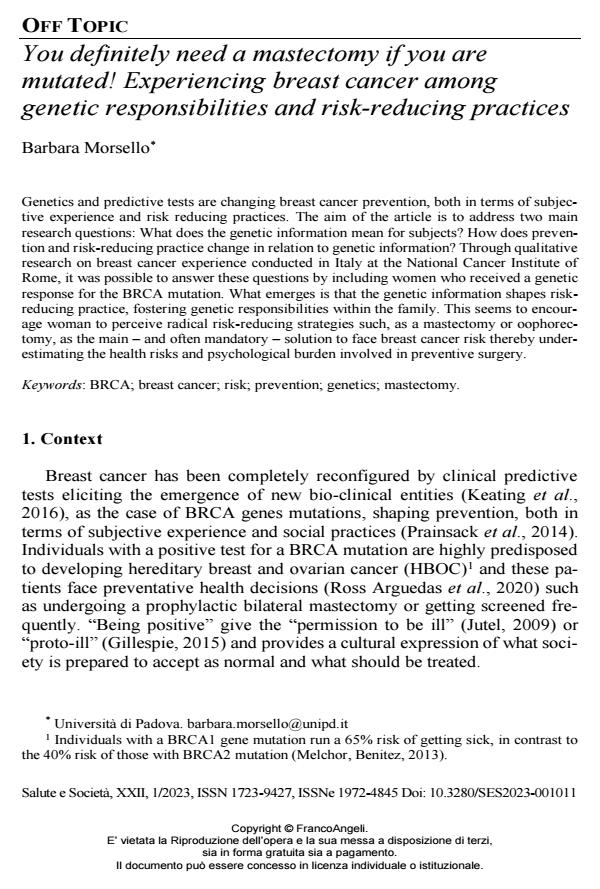You definitely need a mastectomy if you are mutated! Experiencing breast cancer among genetic responsibilities and risk-reducing practices
Titolo Rivista SALUTE E SOCIETÀ
Autori/Curatori Barbara Morsello
Anno di pubblicazione 2023 Fascicolo 2023/1
Lingua Inglese Numero pagine 15 P. 153-167 Dimensione file 387 KB
DOI 10.3280/SES2023-001011
Il DOI è il codice a barre della proprietà intellettuale: per saperne di più
clicca qui
Qui sotto puoi vedere in anteprima la prima pagina di questo articolo.
Se questo articolo ti interessa, lo puoi acquistare (e scaricare in formato pdf) seguendo le facili indicazioni per acquistare il download credit. Acquista Download Credits per scaricare questo Articolo in formato PDF

FrancoAngeli è membro della Publishers International Linking Association, Inc (PILA)associazione indipendente e non profit per facilitare (attraverso i servizi tecnologici implementati da CrossRef.org) l’accesso degli studiosi ai contenuti digitali nelle pubblicazioni professionali e scientifiche
Genetics and predictive tests are changing breast cancer prevention, both in terms of subjective experience and risk reducing practices. The aim of the article is to address two main research questions: What does the genetic information mean for subjects? How does prevention and risk-reducing practice change in relation to genetic information? Through qualitative research on breast cancer experience conducted in Italy at the National Cancer Institute of Rome, it was possible to answer these questions by including women who received a genetic response for the BRCA mutation. What emerges is that the genetic information shapes risk-reducing prac-tice, fostering genetic responsibilities within the family. This seems to encourage woman to perceive radical risk-reducing strategies such, as a mastectomy or oophorectomy, as the main - and often mandatory - solution to face breast cancer risk thereby underestimating the health risks and psychological burden involved in preventive surgery.
Parole chiave:BRCA; breast cancer; risk; prevention; genetics; mastectomy.
Barbara Morsello, You definitely need a mastectomy if you are mutated! Experiencing breast cancer among genetic responsibilities and risk-reducing practices in "SALUTE E SOCIETÀ" 1/2023, pp 153-167, DOI: 10.3280/SES2023-001011